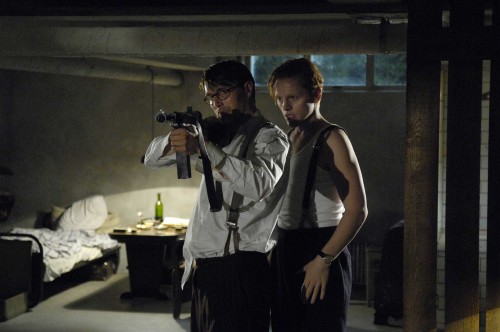Flame & Citronen
How to Make a Cartoon Out of History

Starring: Mads Mikkelsen, Thure Lindhardt
By Robert Patrick
Danish director, Ole Christian Madsen, races his fingers across the creased, water-stained pages of history to pluck the story of two resistance fighters, Flame and Citron, who stood as central pillars in the underground movement against Nazism in Denmark. And while Madsen’s directorial hymn to the fallen heroes of World War II is full of supposed axioms, most of the film is crosshatched with hearsay. Are the main characters capable of dodging insurmountable schools of incoming fire in real life? Probably not. But here, in the snow globe of cinema, a lot of heady liberties are taken that wouldn’t otherwise transpire.
Flame and Citron – yes, the names sound like characters out of Breakin’ 2: Electric Boogaloo – are taxed, disheveled warriors from the Danish underground. Flame (Thure Lindhardt) has a wave of red locks draping over his forehead, hence his name. Citron (Mads Mikkelsen), who looks like a boozehound, never gets his moniker explained. The grim duo spend their weeknights walloping Nazi officers and Danish supporters of Nationalist Germany. When they aren’t packing bullets into people’s heads, Flame pops cigarettes into his mouth and stargazes at women. Citron, on the other hand, mopes around, longs for his family, and suggests that his ex-wife’s new beau take good care of her. They are, to say the least, in spirits that remain dredged by darkness.
There are other guys like them, who also loathe Nazis, and we are introduced to them in order of their importance. The Danish fighters frequent a dank bar, full of soiled tables and wafting smoke. The jovial lot plunk fistfuls of coins onto the table, swish around beer in their mouths, and heckle one another between hearty chuckles. Flame, in a colorful narrative, talks about each resistance member, as the camera glides over their grizzled, war blemished faces. Because the aforementioned sequence purposes a great deal of interaction between these characters, it’s disappointing when we rarely see the motley crew of gun wielding fighters again. Much of the movie, in fact, unintentionally revolves around ideas that putter to a stop before being fully developed – the lead antagonist is expressly like this.
The villain in the movie, Hoffmann (Christian Berkel), gulps down perspiring mugs of beer, prods his adversaries by shooting maniacal grins in their direction, then coddles women. For allegedly being a venomous antagonist, Hoffmann does little in the film but loom in the shadows and partake in one substantial speaking scene; and even then his dialogue seems wafer-thin. Screenwriters Lars Andersen and Ole Christian Madsen doodled in Hoffmann’s dialogue believing it to be great art; however this may be, the Gestapo’s leader still seems more like a throwaway villain design from an antiquated James Bond film than a respectable creative feather in the hat of the movie’s filmmakers. Much to the chagrin of the screenplay, everyone seems to be lacking the same spark.
But the action. The action is the most poorly scribbled parts in the script. Bullets hiss by as glass shatters and wood splinters. And, despite the fact that there are near fifty German troops soliciting outside of the household at one integral part of the movie, Citron still manages to shuttle around, relatively unharmed, while spraying ammunition until droves of Nazis fall to their knees from his ferocious counterattack. Watching Citron roll, dive and plunge throughout the two story home while receiving only minimal damage was more exhausting than exhilarating. The movie, being that it is culled from the eyewitness accounts of fellow Danish resistance fighters, should be a cornucopia of information. Scenes such as the operatic firefight with Citron, for instance, had no reputable sources on hand to verify that this sort of ballistic anarchy really transpired – at least in such an explosive way. I doubt that the Nazis, in being reamed by one resistance fighter, would spread the word that they were ploughed into by one emotionally vexed Danish man. When it comes right down to it, most of this movie seems to have the goliath-like sensibilities of Paul Bunyon. If at a certain time in the film Citron began unearthing trees with his leathered hands, started to launch the trunks with the velocity of a whirling comet, then, finally, impale an entire wall of Nazi officers with the bark, I would not find it unusual. I understand that Madsen, in attempting to make a filmic epitaph to the crestfallen resistance fighters, wanted to shine and buff their legend, but some of this material is almost insulting. No matter how much ridiculousness the director inoculates the film with, I admire his swansong to the men and women who fought in the war – I just wish he could’ve made his characters less like marred superheroes and more like real, living people. Flame and Citron shouldn’t have to swim through thirty-thousand bullets and jump fifty feet down a flight of stairs for someone to admire that the duo took a stand against Nazi Germany. The sentiment alone is enough without having to baste it with fictitious anecdotes until it’s baked into a tall tale.
2/5
